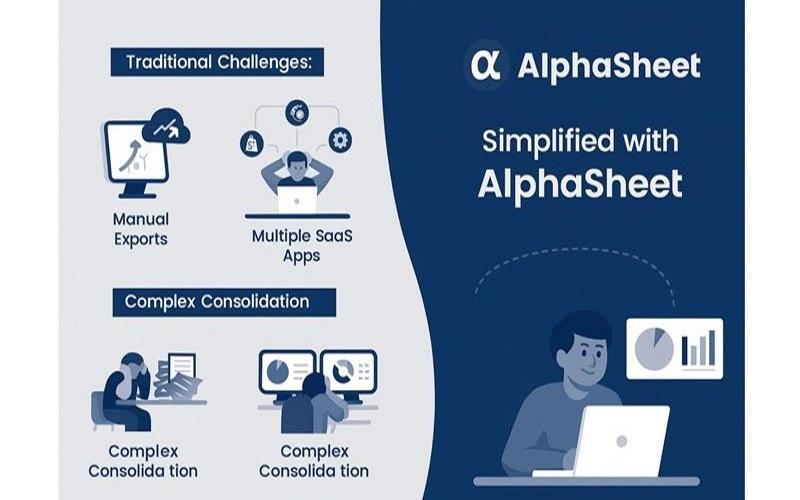In the evolving landscape of workflow automation, businesses are increasingly seeking no-code solutions that simplify manual tasks and enhance productivity. AlphaSheet’s recent launch of its No-Code Workflow Automation Tool offers a compelling alternative to existing platforms such as Zapier and Make, positioning itself as an efficient choice for small and medium-sized businesses (SMBs). This article analyzes the strengths and weaknesses of AlphaSheet compared to other automation platforms, with a focus on costs, return on investment (ROI), scalability, and overall effectiveness.
AlphaSheet sets itself apart by allowing users to link spreadsheets directly to live data sources such as CRMs, accounting tools, and analytics dashboards without requiring technical expertise. The appeal of integrating Google Sheets or Excel files with real-time data is particularly significant for SMBs that often struggle with disconnected systems and repetitive data entry. This advantage may outweigh the capabilities of Zapier and Make, which, while powerful, can be complex and require deeper technical knowledge for full utilization. The introduction of customizable templates within AlphaSheet further enhances its accessibility, enabling users to deploy industry-specific workflows rapidly.
Cost plays a crucial role in any SMB’s decision-making process. Zapier operates on a tiered subscription model that can become prohibitively expensive for larger operations reliant on more extensive automation. Conversely, AlphaSheet’s pricing model, specifically designed for SMB budgets, offers a free trial, allowing prospective users to assess its value without financial commitment. This could result in a higher initial uptake, facilitating faster ROI as businesses delink costly manual processes from their workflows.
However, while AlphaSheet presents clear advantages, it must also contend with some shortcomings. The platform’s scalability may be limited compared to specialized solutions. For example, Zapier supports an extensive array of third-party integrations—over 5,000 apps—providing users with unparalleled flexibility. This is particularly crucial for fast-growing companies seeking to adapt seamlessly to changing operational needs. In comparison, while AlphaSheet provides essential live data connections, its focus appears more narrowed, especially when considering unique or industry-specific integrations. SMB leaders must assess their current and future technical requirements when choosing between such platforms.
The ROI on workflow automation tools is another vital consideration. Studies indicate that organizations leveraging automation can improve productivity rates by as much as 30%. AlphaSheet’s emphasis on real-time updates and automated tasks enables quicker decision-making, potentially leading to increased sales and improved customer experiences. These elements contribute to an efficient use of resources, but concrete statistics from users in terms of tangible ROI will be necessary for potential adopters to gauge AlphaSheet’s effectiveness against its competitors.
An analysis of user feedback and case studies can provide further insight into the effectiveness of these platforms. AlphaSheet has garnered attention for its user-friendly interface, which promotes immediate engagement and reduces onboarding time. This aspect may resonate well with teams that lack advanced technical skills. In contrast, Zapier’s complexity can deter some users, particularly in smaller teams with limited IT support. On the flip side, the less intuitive nature of Make’s interface may pose integration challenges, though its powerful functionality can make it suitable for companies ready to invest time in mastering the platform.
Moreover, companies looking at automation platforms must consider the implications for team dynamics and workflows. The narrative surrounding the adoption of AI-driven tools highlights a crucial pivot towards enhancing employee focus on strategic priorities, rather than mundane manual tasks. While AlphaSheet empowers SMBs to free up resources, the question of cultural fit and change management emerges. Implementing such technology can sometimes be met with resistance, requiring leaders to communicate the benefits effectively and foster a culture of adaptability.
In terms of scalability, when analyzing platforms, one must examine the potential for growth in line with company objectives. While AlphaSheet is designed to accommodate various business needs, its long-term viability will depend on how well it scales alongside organizational growth. As companies expand, their workflow automation needs become increasingly complex, necessitating a platform that can adapt and evolve. Thus, while AlphaSheet may shine for startups and smaller firms, its capacity to service larger enterprises effectively must be closely monitored.
In conclusion, selecting the right workflow automation tool is of paramount importance for SMB leaders aiming to simplify operations and enhance productivity. AlphaSheet offers a fresh perspective on no-code automation, particularly for those wary of technical complexities. Yet, the comparisons drawn with established players like Zapier and Make emphasize that the decision should be informed by specific business needs, including budget constraints, scalability potential, and functional requirements. The insights derived from this analysis position AlphaSheet as a formidable contender in the no-code automation space, yet caution against overlooking established platforms that provide a breadth of integration possibilities.
FlowMind AI Insight: As workflow automation continues to evolve, the strategic selection of tools such as AlphaSheet can significantly impact SMB operations. Maximizing efficiency while minimizing technical burdens is essential in today’s fast-paced business environment; therefore, leaders must continuously evaluate their automation strategies against their unique needs and future growth trajectories.
Original article: Read here
2025-08-11 08:51:00

